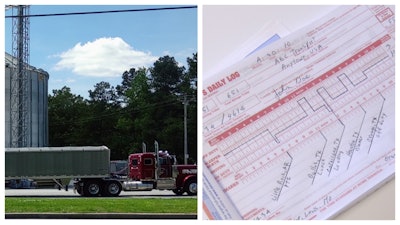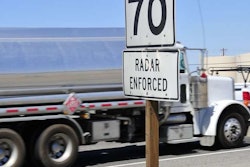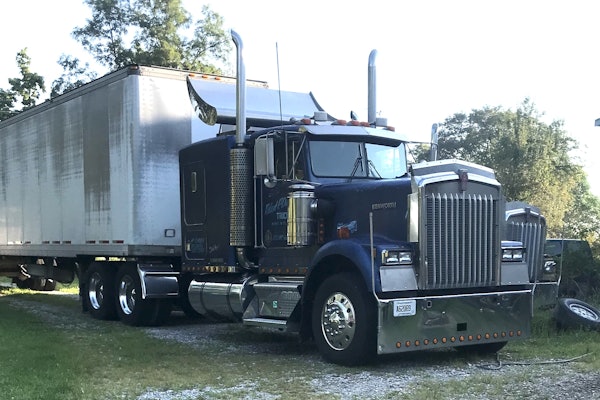
The Federal Motor Carrier Safety Administration has finally answered questions raised in the aftermath of the last Biden-administration extension of the national emergency related to the COVID-19 pandemic. That extension came amid dwindling COVID case numbers and a return to a somewhat more routine footing for life in locales all around the nation. Friday, the FMCSA confirmed it would continue to offer carriers moving a bevy of commodities relief from maximum drive-time limits in the hours of service with yet another 90-day emergency declaration extension.
From June 1 through the end of August, carriers of the following commodities can take advantage of the relief when the haul is in "direct assistance in support of emergency relief efforts related to COVID-19," the agency said:
- Livestock and livestock feed
- Medical supplies and equipment related to the testing, diagnosis, and treatment of COVID-19
- Vaccines, constituent products, and medical supplies and equipment including ancillary supplies/kits for the administration of vaccines, related to the prevention of COVID-19
- Supplies and equipment necessary for community safety, sanitation, and prevention of community transmission of COVID-19 such as masks, gloves, hand sanitizer, soap, and disinfectants
- Food, paper products, and other groceries for emergency restocking of distribution centers or stores
- Gasoline, diesel, diesel exhaust fluid (DEF), jet fuel, ethyl alcohol, and heating fuel including propane, natural gas, and heating oil.
[Related: Will the COVID national emergency declaration's hours waiver extend again?]
Some commodities formerly covered under the waiver are no longer included, notably vehicles, building materials and others that had been specifically mentioned by the FMCSA as qualifying for the exemption as "supplies to assist individuals impacted by the consequences of the COVID-19 pandemic."
Watchers might expect further narrowing at any time, the agency said in the declaration from Deputy Administrator and acting agency chief Robin Hutcheson. "FMCSA intends to continue to closely monitor the safety impacts of the relief granted under this extension. ... As necessary, FMCSA may take action to modify the Emergency Declaration, including scaling back the commodities covered by the Emergency Declaration or changing the restrictions associated with transporting the commodities."

Or, ultimately, to move to terminate the hours relief sooner than the new August end, "if conditions warrant," the agency added.
FMCSA's reporting requirement for motor carriers utilizing the waiver remains in place, following its introduction September 1 last year. The agency cited evidence of continued reliance on the hours waivers as the reason for the continuation. Carriers are reporting to FMCSA through their portal accounts on the DOT website, as previously reported, "their USDOT number; the number of trips made by commercial vehicles under the COVID Declaration; the type of goods transported; and for multiple goods transported, an indication of which commodity was transported the most."
A parallel but independent data collection effort continues, too, from the grassroots operator-advocacy group Trucker Nation via FMCSAReporting.com. Trucker Nation Director of Communications Andrea Marks views the attempt to document the reliance on the waiver as a possible way to underpin further hours of service flexibilities. As she told Overdrive last year, at that point a certain subset of professional truckers had been for 600 days, now well more than 800 days, "proving the point we were all trying to make when we petitioned to change HOS," Marks said. Trucker Nation was after full split-sleeper flexibility when that petition was filed in 2018. Marks hoped her organization's data collection effort might point the way toward a reality that "professional truck drivers can safely self-regulate and it can have a positive impact on highway safety."
Hear more from Marks via her last appearance on Overdrive Radio that follows.
Direct assistance to qualify for use of the COVID emergency waiver, the agency reiterated with its latest extension, "does not include non-emergency transportation of qualifying commodities or routine commercial deliveries, including mixed loads with a nominal quantity of qualifying emergency relief added to obtain the benefits of this emergency declaration." To be eligible for the exemption, the load must be both of a qualifying commodities and "incident to the immediate restoration of those essential supplies."
When transitioning between waiver-qualifying loads and non-qualifying work, the agency said, operators can return empty to a terminal or "normal work reporting location" without complying with drive-time limits. Yet if moving toward another, non-qualifying load after a qualifying one, the agency said, "a 10-hour break is required when the total time a driver operates conducting emergency relief efforts, or a combination of emergency relief and normal operations, equals 14 hours."
[Related: The COVID HOS waiver: Has 'self-regulation' equated to better safety?]









